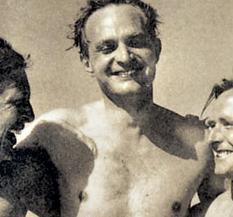Does Your Nanny Drive a Zamboni?
The Pavillion Agency’s vice president Seth Norman Greenberg “has also known families to prize nannies who can steer a 32-foot boat, help manage an art collection or, in one case, drive a Zamboni to clean a private ice rink.”
— This “economy of nannies” story is amazing.
The Disturbing World Of British TV Commercials
The Disturbing World Of British TV Commercials
by TG Gibbon
Fellow Americans, what do you look for in a commercial voiceover? Something non-threatening and reassuring? Maybe something slightly overbearing but ultimately avuncular? Portentous but knowingly so? Sure. Any of those would be a correct answer. A sane answer, even a patriotic one. But most certainly of all a non-Britannic answer. After five years of living in Britain and Ireland and watching shedloads of native television, I can attest that these days the British are tending toward something more unsettling in their commercials.
Why? I’d like to think it’s a dark eruption from the tortured soul of Albion. Some insular affection for unease as a subconscious penance for imperialist sins. As though as a nation they have Pinhead from Hellraiser where their Don Draper should be. But the fact is I’m just not sure at all.
Take the commercial above, part of an ongoing campaign from Birds Eye, featuring Willem Dafoe as a friendly but nevertheless menacing and intrusive talking polar bear. There seems to be no effort to match the voice to the product; as long as it scars the soul it’ll do. In this case I suspect the ploy is a demonstration of the oft-trumpeted off-beat British sense of humor, a mnemonic strategy of cognitive dissonance and silliness. Certainly nobody mixes Willem Dafoe’s voice and make-out music without obvious comic intent. Other spots in the campaign have clear comic signifiers as well.
Less clear are the motivations of the people behind the current ads for Lurpak (a sadly named brand of Danish butter).
Their use of a half-singing, half-accusing Rutger Hauer to pitch their tasty wares certainly appeals to me but unlike most people I stayed up late the other night just to see him in Escape from Sobibor. Considering that their use of the Rich Man’s Busey (or the Poor Man’s Nolte) replaces a long-running and obviously adorable campaign produced by Aardman it’s probably safe to give them the benefit of the doubt as far as knowingness goes — but the thread is thin.
The next two commercials are neither amusing in and of themselves nor with reference to general extrinsic factors. But paired together they combine to create something greater than they deserve. First here’s actor Timothy Spall (father of Rafe and amusing weirdo in his own right) for Wickes, one of a seeming endless number of Home Depot-like DIY chains.
And here is Spall again for British Gas.
Given that there’s nothing especially handymannish about Spall’s working-class London growl (unless you think “The Armando Iannucci Show” was a documentary), you have to wonder why two advertisers with products so oriented towards cosy domestic tranquillity would feel that Spall was the perfect spokesman. Sometimes these ads are played one after the other which is at least a Spall-and-a-half too far.
But when it’s all post-dubbed and done those are just guys with slightly creepy, deep, gravelly voices. Unbeloved insurance company Aviva, however, have taken it a bit further. This isn’t so much a matter of voiceover but of overall content. They have an extensive campaign airing now featuring actually-beloved sketch comedy actor Paul Whitehouse in a series of harmless unfunny attempts at light comedy relating to insurance. Oh it’s all well and good for travel insurance and home insurance and pet insurance and that sort of thing but what about life insurance? Sensibly they decided to cut even the lightest comedy out of the life-insurance spots. Unfortunately to even weirder effect.
To their credit subsequent viewings make it clear that the final twist is impressively well-foreshadowed for such a short piece. Quality, though, is not the issue — that Lurpak ad is beautifully shot and edited — tone is. If this is the result of an industry-wide lurch to the uncanny then I’m all for it. But if it is, as I worry at my darkest, least charitable moments, more a symptom of a culture-wide tendency towards signing up any celebrity for any task that any unknown could do just as well, then it’s a damned shame. Just the sort of thing you might expect from a country with the rich asshole from an ’80s teen movie where its Barack Obama should be.
Perhaps, though, there really isn’t any mystery to it, no dark interpretation. Maybe they don’t find smug ghosts selling insurance to their vaguely Elektra-fied daughters to be in questionable taste. Maybe laughing at the tough-guy menace of Dafoe and Hauer is a way of celebrating that they have built a society in which, knifecrime aside, they are generally far-removed from violence. And maybe Spall’s earthy voice tells them that it’s not just the ambitious media studies robots, or the privileged, or the well-connected that deserve to be heard. Maybe it’s a shame there aren’t more ads like these.
Related: Eight Great Commercials With Writers As Pitchmen
TG Gibbon is unknown but really couldn’t do any better.
Woman Multitasks
“A bigamist who fooled a doctor into giving her sleeping pills by dressing as a man has been spared jail.”
Is Your Fatness Making You Bald?

“Scientists in countries where the American diet — lots of sugar, refined carbs, and refined vegetable oils — is becoming a new cultural norm were eager to see if hair loss is influenced by what we eat. Since 2009, three major studies [have found] that men with insulin resistance, a condition that leads to diabetes and obesity and is linked to heart disease, were much more likely to be bald. The most common cause of insulin resistance? A diet laden with sugar and refined carbohydrates. Now that all the dots are there, scientists are trying to connect them by demonstrating that what you consume — carbs in particular — causes chrome-dome syndrome.”
— So, by the transitive property, we can blame our iPhones for our loss of hair. Ugh, also, no more mozzarella sticks for me. I need this hair. [Via]
Photo by Simone van den Berg, via Shutterstock
An Incredibly Boring Tour of New York City
“Thomas Wolfe put the finishing touches on Look Homeward, Angel while living on the second floor of 27 W 15th Street in 1928”: A literary tour of New York City that you should never bother to take. Look, here’s an alley where someone once walked! (via)
Literary Scandals of Yesteryear: David Leavitt and Stephen Spender

Literary scandals come for everyone, eventually. (Okay, not everyone: Toni Morrison, scot-free!) Or maybe just everyone named David. Let’s turn the clock back to the delicious year 1994. In late 1993, David Leavitt published While England Sleeps, about, simply, two men, one who becomes a zealot, signs up with the International Brigade, and then regrets it; his lover comes to Spain to try to rescue him. One source he drew upon was a memoir, by Stephen Spender, who sued based on copyright as we also understand it in the U.S. but also on the British iteration of moral rights, which we would consider (quite) expansive. And this was a fairly rare case in literary scandoldom, in that it involves a work of fiction drawing upon a work of nonfiction.
The most interesting way to read about this conflict is in reverse order of the parties’ individual publications in the Times, because that is how we used to settle our literary disputes, starting with Spender’s long public complaint, which is stirring, arch and bitchy, in the way that only a then-85-year-old English intellectual could be.
Mr. Leavitt, in his essay, wrote that the theme of his book, “if it belongs to anyone, belongs to E. M. Forster, who wrote in his famous essay ‘What I Believe’” that “ ‘if I had to choose between betraying my country and betraying my friend, I hope I should have the guts to betray my country.’” Mr. Leavitt added: “It seems to me crucial, in reading these sentences, to remember that Forster was homosexual, since for gay men and lesbians the choice between cause and friend is rarely abstract; indeed, particularly in the age of AIDS, it is often viscerally real.”
It is surprising to a member of my generation that sometimes young people today cannot imagine the intense urgency with which antifascist youth responded in 1937 to the probability of Hitler’s prison state gaining total domination of Europe. The idealistic volunteers in the International Brigade felt that far from betraying their country, they would preserve its freedom by fighting to prevent, as they believed, the greater catastrophe of a world war…..
In appropriating for his own novelistic purposes this Spanish episode from my book, Mr. Leavitt added a new, distorting dimension to “World Within World” by introducing into the story of an upper-class English writer and his working-class friend lubricious accounts of homosexual lovemaking between them. This left me wondering: if the laws regarding obscenity had been different when I wrote “World Within World,” would I have added scenes describing sexual acts?
The answer, I am sure, is no. In our own lives, living among other people, we are aware, of course, of their love affairs, heterosexual or homosexual. But we do not know, nor, I think, want to know about their sexual acts. Knowledge of what people do when they are in bed together may be true, but it is not true to what we know or wish to know about them.
In part that’s one reason why I resent my biography being mixed up with David Leavitt’s pornography. I still feel that if he wanted to write about his sexual fantasies, he should write about them being his, not mine, for by his use of my copyrighted book, his central narrator was made clearly identifiable.
It’s a fairly stirring defense! While also prudish and priggish.
Five months previous, this is what Leavitt had published:
THAT MOST NOVELS CONTAIN episodes derived from “real life,” as well as characters based on real people, is a fact taken for granted by students of literature, not to mention literary biographers…..What is plagiarism? I had always assumed that plagiarism meant trying to pass off someone else’s writing as one’s own. “While England Sleeps” does nothing of the kind; rather, it is a piece of historical fiction based on the facts of someone else’s life. “The true artist,” Oscar Wilde observed, “is known by the use he makes of what he annexes, and he annexes everything.” Yet if the current legal trend in England continues, it may lead to the imposition of a standard few works of fiction could ever meet. England, a nation with no equivalent of our First Amendment, a nation that has given us Clause 28 (forbidding the provision of funds for material that is seen to “promote” homosexuality), a nation that legislates for male homosexual sex a higher age of consent than for either heterosexual or lesbian sex because supposedly boys mature more slowly than girls, may well be on its way to becoming a nation in which writers are simply afraid to write.
“While England Sleeps,” among other things, is a novel about the hypocrisy of English attitudes toward homosexuality. In this regard its writing prophesied the crisis its publication would precipitate.
This battle has attractive propositions on each side, unlike the grimier battles of today — at least no one felt the need to talk about “emotional truth,” the kind of thing we have to hear from the “semi-non-fiction crowd,” and the likes of John D’Agata.
And Leavitt ends with a bit of generosity that he might yet live to regret: “I am 32 and I have never written an autobiography; but if I ever do, and if something in its pages grabs some young novelist’s attention, I hope he’ll feel free to take whatever he wants from the story.”
Aspirin Prevents Cancer AND Sluttiness
Aspirin: Is there anything it can’t prevent? On that subject, if aspirin is so good for you, how come everyone is all, oh, take a low dose? I’m gonna take a full dose and get me some extra cancer prevention!
Chuck D To Welcome Beastie Boys To The Terror Dome
“Chuck D, Public Enemy’s No. 1, will induct fellow New York rap act Beastie Boys. The groups’ debut albums were released within two months of each other. The Beasties have topped the Billboard 200 album chart four times.”
— Next month, when Chuck D gives his speech to induct the Beastie Boys into the Rock and Roll Hall of Fame, it would be funny if he quoted himself and referred to the three Jewish rappers being “so-called chosen/frozen” for perpetuity among the pantheon of rock greats. I love the Beastie Boys and I think they’re deserving of all accolades available. But I think the Rock and Roll Hall of Fame should probably not exist. And the fact that Chuck D has not yet been enshrined himself points to one of the reasons why. No, it does not. Because that fact is likely due to the other fact that Public Enemy is not up for induction until next year. My apologies to the voting committee. (Of this institution that should probably not exist.)
Abandoned Listicles Without Commentary, In Order Of How Close They Were To Completion

14. Pi, In Reverse Order
13. Manhattan’s Best Urinals, In Order
12. The Varieties of Religious Experience
11. People I Have Been Confused For On The Street, In Order Of How Similar They Look To Me
10. Single-Season Sitcoms Of The Seventies, In Order
9. Famous Mustaches, In Order Of Historical Significance
8. Recent News Stories, In Order Of How Deeply They Make Me Despair Over The Human Condition
7. Letters Sections Of Conde Nast Publications, In Order Of How Wildly Out Of Touch They Show Their Readers To Be With Reality
6. Childish Things, In Order Of When I Put Them Away
5. Smells Of New York City In The Summer, In Order Of Putrefaction
4. Terrible Recurring Themes In My Dreams, In Order Of Plausibility
3. Things I Would Not Eat For Money, In Order Of How Really Really Badly I Would Not Want To Eat Them
2. Mexican Epithets For Homosexuals, In Order Of Sibilance
1. Breasts, In Order
Photo by Mehmet Dilsiz, via Shutterstock
Hibernation Helps Bears Heal
“To test the healing ability of the bears, the zoologists proved they were willing to risk it all in the name of science. They gave small cuts to the skin of a group of wild bears they were observing just as the bears were preparing for hibernation. Then they backed off and let them hibernate for two to three months. As the bears were reaching the natural time in the season when they wake up, the brave bear researchers checked the wounds. Not only had every bear healed itself, the skin had sealed up with little visible damage and even started growing new fur.”
